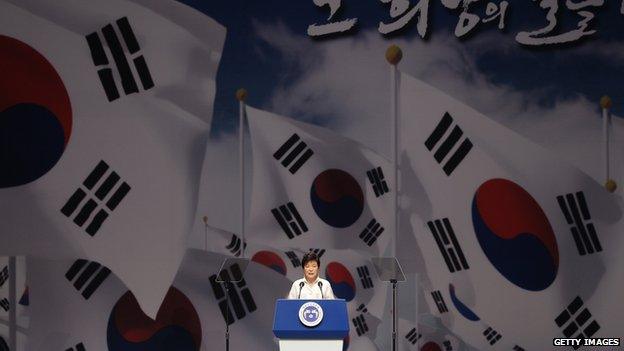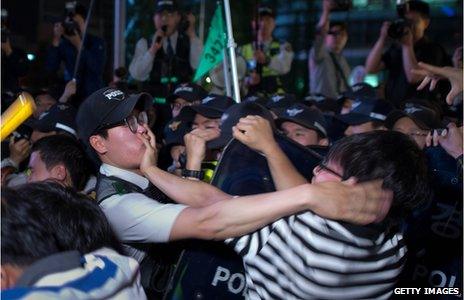Why South Koreans are fleeing the country's biggest social network
- Published

The president of South Korea has pledged to prosecute people spreading rumours about her on the Kakao Talk chat app. Now users are fleeing the social network, and seeking refuge in a German alternative.
The story begins at sea. Back in April, 304 people died when the South Korean Sewol ferry capsized just off the country's southern coast - one of the worst maritime disasters in the country's history.
The government of President Park Geun-hye has been widely criticised for its handling of the incident. Protests have broken out in the capital city, and some of the victims' families claim the authorities botched the search and rescue, external. A recent painting by a prominent artist, external depicted the president as simply continuing in the footsteps of her father, who had led the country under military rule. And a Japanese newspaper reported, external that Geun-hye - who is not married - was not in her office on the day of the sinking, but instead meeting with a recently divorced former aide. Seoul has strongly denied the report, calling it "baseless" and "malicious".
Insults and rumours continued to spread, however, and in late September the president announced she was cracking down on the citizens responsible for circulating them. Kakao Talk - a smartphone messaging app used by 35 million of the country's 50 million people - has been one of the her primary targets. The firm is headquartered in South Korea, and some Kakao Talk users have reportedly received notices that their accounts have been searched by investigators, external.

The government's handing of the ferry led to protests in Seoul in May
Now, some 400,000 users have deserted the service, according to Rankey.com, external, a site which tracks app usage. HwanBong Jung, a journalist in the country, tells BBC Trending that "people feel uncomfortable." The firm has said it cannot deny the government's requests for information, he explains.
The exodus has proved a boon for another chat app - Telegram Messenger - an encrypted messaging service based in Germany, with no servers in South Korea. The company behind the app, founded by the same people, external that created Vkontakte, Russia's largest social network, says 1.5 million new South Korean users have signed up for the service in the last seven days.
Unlike Kakao Talk, Telegram Messenger offers a "secret chat" option, using end-to-end encryption. The technology means the company is unable to decrypt any of the messages itself, so couldn't hand over information about its users, even if requested.
One South Korean newspaper reports, external that Kakao defectors have developed a wry greeting when finding each other on Telegram, saying simply: "Welcome to exile."
Reporting by Sam Judah, external and Thom Poole
You can follow BBC Trending on Twitter @BBCtrending, external
All our stories are at bbc.com/trending